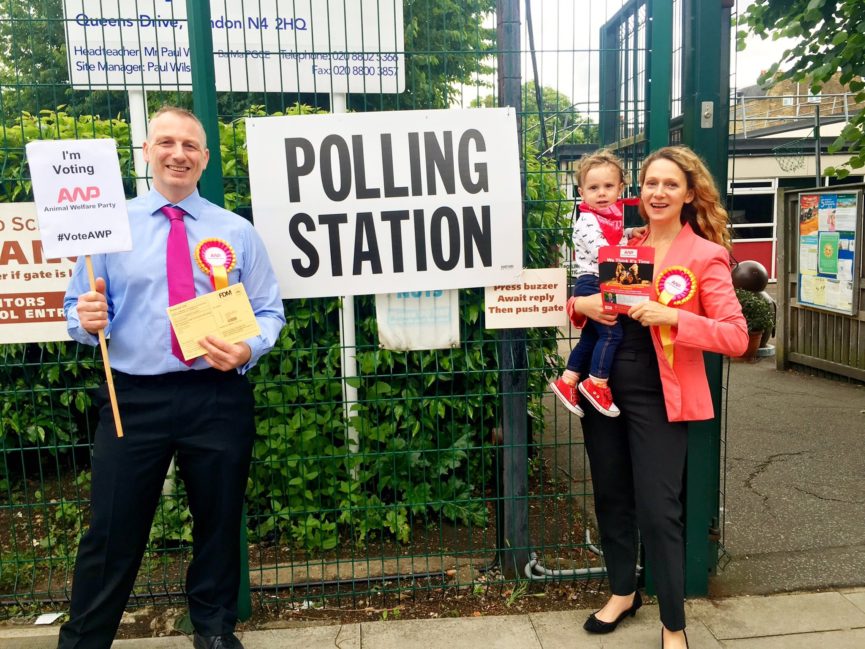El partido británico por el bienestar animal, satisfecho con el resultado
El pasado 8 de junio, el partido británico por el bienestar animal, Animal Welfare Party (AWP), participó en las elecciones parlamentarias y, aunque no ha podido conseguir ningún escaño, está satisfecho con el resultado dadas las circunstancias políticas del Reino Unido en este momento. El partido tomó la decisión estratégica de participar en cuatro distritos electorales: Maidenhead, Hackney South & Shoreditch, Lewisham Deptford y Hackney North & Stoke Newington. El resultado muestra un ascenso en el número de votos respecto a las últimas elecciones de 2015.
La líder del partido, Vanessa Hudson, dijo después de las elecciones: “Podemos estar satisfechos con los resultados electorales, considerando el carácter de las elecciones y la presión que han sentido la mayoría de los partidos pequeños, una presión que el AWP no ha experimentado. ¡Muchas gracias a todos los que han votado al AWP, nuestros afiliados y simpatizantes!”

AWP en un colegio electoral
El viejo sistema electoral británico hace casi imposible para partidos nuevos y pequeños conseguir un escaño en la cámara baja. El Reino Unido cuenta con 650 distritos electorales, cada uno de los cuales proporciona un parlamentario. En cada distrito solo cuenta el ganador, aquel que ha obtenido más votos. Aunque los partidos nuevos y pequeños obtienen muchos votos, estos no se traducen en escaños, porque normalmente no son el partido más votado en cada distrito. Por eso se pierden muchos votos y el elector tiene menos incentivos para votar a un partido pequeño. A esto hay que sumar el hecho de que estas elecciones han estado completamente marcadas por la lucha entre el partido conservador de la primera ministra actual, Theresa May, y el partido laborista de Jeremy Corbyn, circunstancia que le ha puesto las cosas aún más difíciles al Animal Welfare Party para hacerse un hueco en la cámara baja del Reino Unido.
On 8 June, the British Animal Welfare Party (AWP) entered the 2017 General Election. Despite having gained no seats, the party was still happy with the results given the political situation in the United Kingdom. AWP made the strategic choice to participate in four constituencies: Maidenhead, Hackney South and Shoreditch, Hackney North and Stoke Newington, and Lewisham Deptford. The results have shown an increase in the number of votes in comparison to the previous election in 2015.
After the election, party leader Vanessa Hudson stated: “We are delighted with the results, given the nature of the election and the squeeze felt by most small parties – a squeeze not felt by AWP. Huge huge huge thanks to all who voted for AWP, our members and supporters!”

AWP at polling station
Britain’s old-fashioned electoral system makes it virtually impossible for new and small parties to gain a seat in the House of Commons. There are 650 constituencies in the United Kingdom, each electing a single Member of Parliament. Only the winner of a constituency, the one with the most votes, counts. As new and small parties are often not the largest parties, despite getting many votes, they do not gain any seats in the House of Commons. This way, many votes are lost and voters have less incentive to vote for small parties. In addition, this General Election has been dominated by the battle between Prime Minister Theresa May and her Conservative Party on the one hand, and Jeremy Corbyn and his Labour Party on the other. This has made it even harder for the Animal Welfare Party to gain seats in the House of Commons.